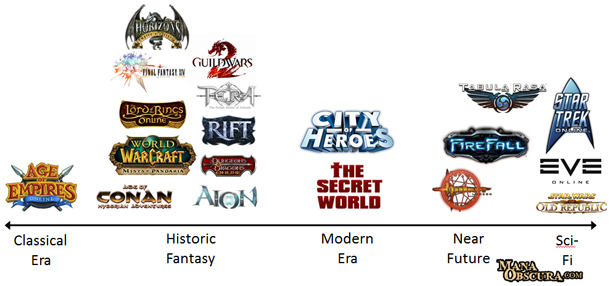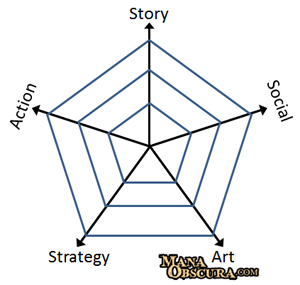
I’m incredibly excited by the future of MMO gaming. This year alone, the launch of TERA, Guild Wars 2 and The Secret World shows that developers aren’t afraid to experiment with new concepts in order to keep the genre alive and fresh. The free-to-play market is also bubbling away, with Firefall, Warhammer Online: Wrath of Ancients, and Tribes Ascended offering us new and unique experiences.
If anything, the free-to-play model has shown Western studios that it is possible to make a good quality MMO without the overhanging subscription free. Although we’ve seen many top-flight examples switch from subscription to free-to-play and do well, it’s likely that some of the next wave of MMOs will directly choose similar model, even if there’s a box fee attached to get started.
The trouble is, MMOs have a long lifespan. World of Warcraft has been running since 2004, but there some that started even earlier that are still in operation today. By coming up with alternative ways to generate income from MMOs, developers can keep their games running with much smaller player numbers. For new entrants looking to make a splash, the MMO marketplace is getting pretty congested.
Slicing the Sausage
There are two ways in which MMOs can differentiate themselves – thematically and mechanically. We don’t want to be paying for games that have similar settings and similar mechanics, as they don’t offer us new experiences. Cut away the story and you’re left with an identikit experience.
If you collect all of the different MMOs and arrange them by the time period they’re set, then compare their complexity on art style, story, strategy and so on, you end up with a rough sausage shape. This Trans-Temporal MMO Sausage bulges where there are several MMOs with similar settings and offering a range of styles, and thins out where there are only maybe one or two fairly superficial games.

This means that there’s some very familiar sausage-meat in the regions of medieval high fantasy and far-flung spaceship-faring future. Creating a an MMO with a theme in one of these periods relies on huge amounts of effort to be unique in terms of mechanics, story delivery and so on.
But this also means that there are opportunities. Although 1800s era Steampunk is often cited as a possible choice (indeed, the whole range from 17th to 21st Century is ripe for exploration), there’s also the classical and prehistoric eras available. In the future, cyberpunk (as characterized by Deus Ex) and other near-future non-apocalyptic options are possible. It’s more challenging to try and produce games that fit these periods without being a history lesson, but alternate history/alternate reality games such as The Secret World are examples of how this could give writers space to create fantastic stories.
 Cutting the sausage another way, there’s also the way of looking at how our games are made, from the simplistic to the complex. As an example, this is why Guild Wars 2 is gaining momentum even though it’s high fantasy – many of the mechanics and concepts it uses are either completely new or radically different to others in the same space. It also means that offering something different, such as a medieval MMORTS, has the potential to stand out.
Cutting the sausage another way, there’s also the way of looking at how our games are made, from the simplistic to the complex. As an example, this is why Guild Wars 2 is gaining momentum even though it’s high fantasy – many of the mechanics and concepts it uses are either completely new or radically different to others in the same space. It also means that offering something different, such as a medieval MMORTS, has the potential to stand out.
That complexity doesn’t just have to come from mechanics. It can be choices like art style (realistic versus simplistic), story delivery (text quests versus fully voice acted), action style and so on. Whatever criteria are important to you can be added to give the sausage some cross-section.
Stating the Obvious
For MMO veterans, this is nothing new. We tend to stick to our current game because of the relationships we build while playing it, and only tend to switch long-term if something significantly different gains enough critical mass to hold us. We might dabble in several different games, but we tend to only stick to one or two.
It’s for this reason that I’m dubious about announcements like The Elder Scrolls Online. From what I’ve read and heard about the game, it’s largely following a Warcraft-style experience in a fantasy setting, with possibly some Guild Wars 2 questing elements thrown in. While the lure of the franchise might pull some players in, I don’t think there’s enough there at present to make it sufficiently unique to those who aren’t familiar with the game world. Times may change as more news comes out, but currently it feels like the wrong game at the wrong time.
Examine the Sausage
If I were looking at developing a new MMO today, I’d look at plotting out my own sausage. Look at the games currently on the market or likely to come out over the next couple of years that I’m likely to be competing with, and see if they create any bulges. If there’s places where the sausage is particularly thin, they’re ripe for me to exploit. That leads on to new types of gameplay, and so on.
While pulling on an existing franchise is great for growing the overall MMO playerbase, it’s completely new settings combined with radically different settings that have the biggest potential to succeed in a genre where players mostly stick to what they’re playing unless there’s something sufficiently different to pull them away. It’s why I’m enthusiastic about this year’s MMO releases, and why I’m hoping that it’s something that continues in the future.
Vive la différence!
(sausage image from David Monniaux on Wikimedia Commons)
How can be in the future when it happens “a long long time ago” 😉
^star wars
Because I haven’t found a T-Rex fossil clutching a lightsaber yet.
thats because it was also in a galaxy far far away……
I’d pay for an mmo with dinosaur jedis dual-wielding lightsaber nunchucks.
Nice writeup, but a word of caution. Targeting underused niches isn’t just a matter of finding lean areas on that conceptual grid. It has to be plotted against the potential *audience* as well. A sweet steampunk title might be great for me, but I’m pretty sure that the potential audience is smaller than that for, say, a Game of Thrones or *coughElderScrollscough* MMO, even though the “historical fantasy” market segment is crowded.
Couldn’t help but read this saying “that’s what she said” after every few lines 😀
It’s an interesting topic, and like you I’m wary of ESO / GoT. I love the worlds and lore, but… well… what’s the point?